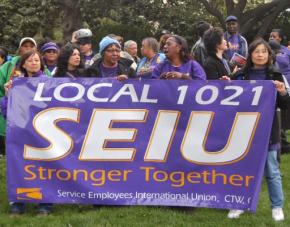SF workers stop concessions
, vice president of SEIU Local 1021 (for identification purposes only), reports on a win in the city and county workers' contract battle in San Francisco.
AFTER MONTHS of campaigning, organizing and demonstrating, thousands of San Francisco city and county workers won big gains in their contract fight in May.
Service Employees International Union (SEIU) Local 1021 represents 12,000 workers, including librarians, custodians, social workers, public health workers and hundreds of other classifications in dozens of city departments.
Like public-sector workers across the country, San Francisco workers have been hard hit over the past four years, suffering layoffs and economic concessions in 2009, furlough days in 2010 and pension concessions in 2011.
Vowing to get ahead of the concessions curve, San Francisco workers began their contract fight early, launching a "no concessions" campaign and initiating a contract action team (CAT) even before electing their bargaining team.
San Francisco's city management dusted off their tried-and-true concession game plan, citing a deficit of $170 million and demanding the continuation of furlough days, cost-shifting on health care premiums, limitations on the number of union stewards, and a list of 60 other takeaways.

Local 1021's bargaining team, building on members' concession fatigue, advanced more than 140 proposals--ranging from pay hikes to protections against contracting out to improving anti-discrimination language. The CAT slowly built momentum, starting with surveys, worksite meetings, lunch-time educationals, job actions and gradually increasingly larger public demonstrations.
The contract fight culminated with 1,500 members massing on April 18 at City Hall and marching to one of the city's busiest intersections to engage in civil disobedience. SEIU chose the location for its symbolism--the intersection housed the City's Department of Human Resources and a large branch of the Bank of America.
THE UNION, building on its anti-foreclosure work and drawing on its community allies, reframed its contract fight and the budget deficit as a "revenue deficit" and focused on San Francisco's broken business tax.
Ten years earlier, 52 of the country's largest corporations sued San Francisco to overturn its business tax--a tax levied on corporate profits. Successive city governments chose not to replace the business tax, essentially giving highly profitable real-estate firms, multinational corporations and financial institutions a 10-year "tax holiday."
Local 1021 dubbed its contract fight and its campaign to tax big business "The City We Need, Not Downtown Greed!" with SEIU members vowing not to take any further cuts while big business was on a "tax holiday." By shifting the debate from budget deficit to revenue deficit, SEIU won public support to tax the 1 percent and to stop balancing the city's budget on the backs of public workers.
In the end, Local 1021 workers successfully resisted new wage concessions, ended all furlough days, restored all previous economic concessions, and won a 3 percent pay raise in year two of the contract. This will be the first real pay raise for San Francisco city workers in nearly five years. Also, the local held its ground on the health care cost-shifting that most other city unions accepted.
However, an arbitrator ruled that SEIU would be subject to the health care cuts on the first day after the new two-year contract expires unless SEIU and the city reached an alternative agreement. Members saw this two-year delay as a victory, giving them the chance to continue to fight against health care cuts.
In the contract fight, SEIU prioritized ending the growing use of temporary workers. Some 21 percent of the union's 12,000 members were temporary, provisional or "as needed workers." The union scored a big win in this area, securing language that severely restricts the city's use of temporary workers going forward and provides that any temporary worker who has worked 1,500 hours over the past three years will be prioritized for a full-time position.
While the large SEIU city contract is settled, other SEIU bargaining units continue to battle concessions. Registered nurses represented by SEIU also won a new contract that successfully resisted a drive by the city to gut patient-staffing ratios. The nurses stopped most of the city's demands for takeaways and also secured a 3 percent raise. Local 1021 is continuing its campaign to win a 3 percent cost of living for the city's publicly funded non-profit workers.
SEIU is in coalition with other community organizations to win an across-the-board raise for all the city's low paid, non-profit workers, whether unionized or non-unionized.


